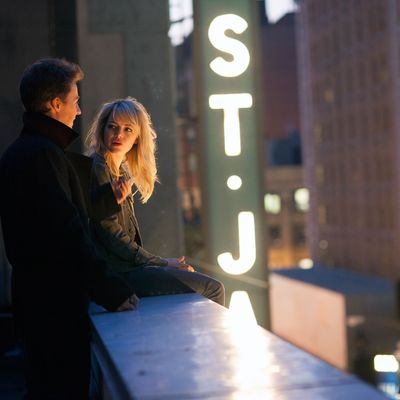
Director Alejandro González Iñárritu (21 Grams, Babel) films the teeming backstage showbiz drama Birdman or (The Unexpected Virtue of Ignorance) in what’s made to look like a single take, transcending time and sometimes space, soaring off into fantasy while essentially remaining — thanks to the illusion of fluidity — grounded in the here and now. The movie centers on the fevered exertions of Riggan Thomson, a fading movie star played by Michael Keaton (he made his fortune, like Keaton, in the role of a superhero), to prove himself on Broadway in a self-penned, self-directed adaptation of Raymond Carver’s “What We Talk About When We Talk About Love.” The camera hurtles after Riggan from his dressing room to the stage (often he’s chased by his harried producer, played by Zach Galifianakis) and back to his dressing room, with glimpses on the way of, among others, a whiny actress (Naomi Watts), her hot-dog actor boyfriend (Edward Norton), and Riggan’s mouthy, fresh-from-rehab daughter (Emma Stone). In between his clashes with actors, Riggan is taunted by the voice of his old character, Birdman, who reminds him of his sorry state and how much more deserving he is than the rest of the wretched showbiz world. How the superheroic have fallen!
Birdman is the very definition of a tour de force, and Iñárritu’s overheated technique meshes perfectly with the (enjoyable) overacting — the performers know this is a theatrical exercise and obviously relish the chance to Do It Big. But what comes out of the characters’ mouths is not so fresh. In the course of the film’s two hours, we learn that Riggan wasn’t there for his daughter growing up, that he was lousy to his wife (Amy Ryan), that he has an actress girlfriend (Andrea Riseborough) to whom he can’t make the ultimate commitment. Mostly Riggan marinates in self-pity — for all his energy, he’s a tiresome character. I had to remind myself that, good as Keaton is, he has been so much freer and more fearless onscreen. Though he got rich as Batman, he made his mark as a clown; his Beetlejuice the bio-exorcist remains one of the modern screen’s most rollicking comic creations. The somber Birdman persona doesn’t connect with anything in Riggan’s or Keaton’s personality; it’s just a pretentious literary conceit. How much different this movie would be if Riggan were visited by Beetlejuice — a reminder of what Keaton was once and could be again.
We root for Riggan — how could we not? — but Iñárritu never bothers to tell us if his Carver adaptation deserves to succeed, if it’s good. The snippets we see are stilted and obvious, though the sheeplike audience is shown marveling. (Iñárritu doesn’t seem to have much respect for the medium of theater.) The film’s low point is a scene with a smugly corrupt New York Times chief drama critic (Lindsay Duncan), who pens her reviews in a Theater District bar and tells Riggan that sight unseen she’ll destroy his show because he’s a movie star — as if critics weren’t (along with everyone else) delighted to see film actors test themselves onstage and fill the houses. (Iñárritu should hardly complain about critics, most of whom were wowed by the pretend depths of 21 Grams and Babel.) The film’s bright spot is Norton, whose matinee idol exists on a level of jerky entitlement that’s positively mythic. He’s a gleeful exhibitionist and Lord of Misrule — Beetlejuice as a Method actor.
Birdman is the sort of film that wins standing ovations from audiences, and they’re not unwarranted. How can you not be in awe of the sheer physical achievement, of the intricate choreography of the actors and the camera, of the gung ho performances? When it ends you go, “Whew!” It’s a triumph of vacuous virtuosity.
*This article appears in the October 6, 2014 issue of New York Magazine.


